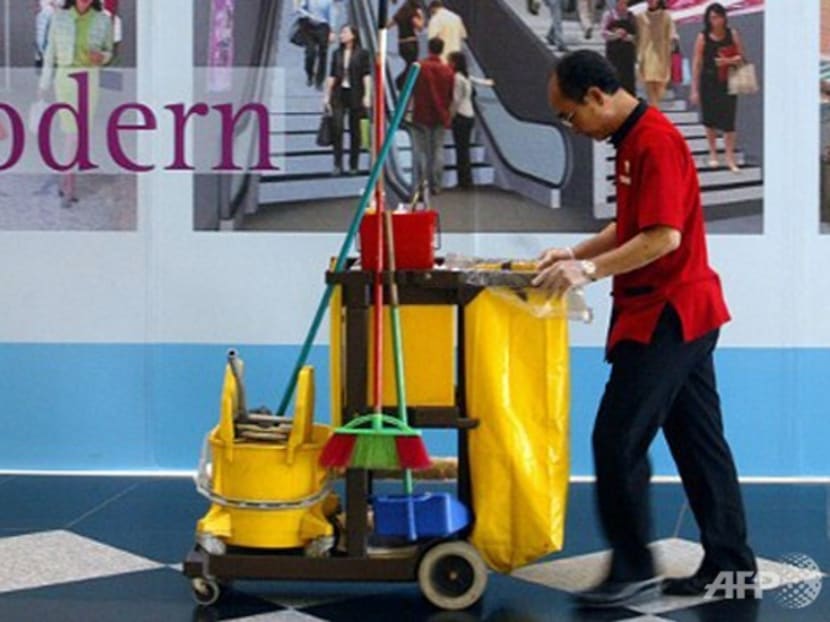Cleaning businesses to be licensed by Sept 1
SINGAPORE — With the Environmental Public Health (EPH) Amendment Bill coming into force today (April 1), Singapore authorities are reminding cleaning businesses to submit their applications for cleaning business licences.
SINGAPORE — With the Environmental Public Health (EPH) Amendment Bill coming into force today (April 1), Singapore authorities are reminding cleaning businesses to submit their applications for cleaning business licences.
With the new Bill, all general cleaning businesses in Singapore, even if these services form only part of their overall business, will have to be licensed before Sept 1.
The National Environment Agency (NEA) said cleaning businesses are strongly encouraged to submit their applications with the necessary supporting information by July 15 so as to obtain their licences by Sept 1.
Service buyers are also reminded to check that their cleaning service providers are licensed, and the list of licensed cleaning businesses will be updated periodically and is currently available on the NEA website,
The regime requires licensees to have written employment contracts, provide training to employees and have a progressive wage plan. This ensures that cleaners receive wages that are commensurate with their skills, training and productivity.
An estimated 55,000 resident cleaners will benefit from the scheme.
According to NEA, service buyers and consumers can look forward to more reliable and better quality cleaning services.
NEA’s chief executive officer, Mr Ronnie Tay, said: “The new licensing scheme will serve to raise the productivity, professionalism and the service standards of the cleaning industry.”
“Cleaning businesses are strongly encouraged to send their cleaners for training and to apply for their licences early so that they can continue business operations without any disruption.”
The Commissioner for Labour has considered and fully adopted the Tripartite Cluster for Cleaners’ (TCC) recommendations for resident cleaners’ starting basic wages.
Cleaning businesses seeking to be licensed from today will need to submit a progressive wage plan for resident cleaners, specifying basic wages no less than the wage levels for each class of cleaners under the progressive wage model (PWM).
Licensed cleaning businesses must also provide their cleaners with pay slips and employment contracts that state wages in accordance with their submitted progressive wage plan.
From Sept 1, the Commissioner for Labour will enforce the PWM requirement for all new contracts, which cover all service contracts entered into from today.
For all other existing service contracts entered into before today, cleaning businesses will have until Sept 1 2015 to pay cleaners wages according to the PWM.
Cleaning businesses can refer to the Report of the Tripartite Cluster for Cleaners for details on the definitions of the various cleaner job categories under the PWM agreed by the TCC, as well as other clarifications by the TCC to help companies comply with the PWM requirement.
Cleaning businesses would need to have at least 50 per cent of their cleaning staff trained in at least one module within the Environmental Cleaning (EC) Workforce Skills Qualifications (WSQ) framework at the point of first application.
At the time of their first licence renewal, 100 per cent of their staff should be trained.
Mr Ng Cher Pong, chief executive of the Singapore Workforce Development Agency (WDA), said: “To support cleaning businesses in meeting the licensing requirements, WDA has worked with our training partners to provide flexible and accessible training through initiatives such as on-site and bite-sized training.”
“We strongly urge all cleaning businesses to start scheduling their staff for training now, ahead of the licensing deadline.”
In response, stakeholders expressed concerns over the licensing process.
Ms Deanne Ong, vice president of EMAS, said: “The biggest challenge would be (the) cost of administrating this process of licensing — especially in training because the cleaning industry has a large pool of workers.”
“The other concern that I think many of our members have is whether our service buyers and clients understand the licensing requirements and I believe that the government agencies are educating them to make sure that they are aware that they should be getting licensed companies.”
Cleaning company Conrad Maintenance Service is concerned about the training requirements when it comes to foreign workers.
Mr Raymond Ng, managing director of Conrad Maintenance Services, said: “We might be facing a problem where we are investing on the training for the foreign worker but yet, the foreign worker might choose to leave the job and return home after the work permit expires.”
From Sept 1, general cleaning businesses found operating without a valid licence will be liable to a maximum fine of S$10,000 or up to 12 months’ imprisonment, and S$1,000 every day for continuing offences.
Licensed cleaning businesses found to be in breach of licensing conditions may also face a maximum financial penalty of S$5,000.
They also risk having their licences suspended or revoked. Service buyers must also ensure that their cleaning service providers are licensed or they risk being fined up to S$10,000 and S$1,000 every day for engaging unlicensed cleaning businesses.
Cleaning businesses can contact NEA at 1800-CALL NEA (2255-632) or visit the NEA website for more details on licensing. CHANNEL NEWSASIA







